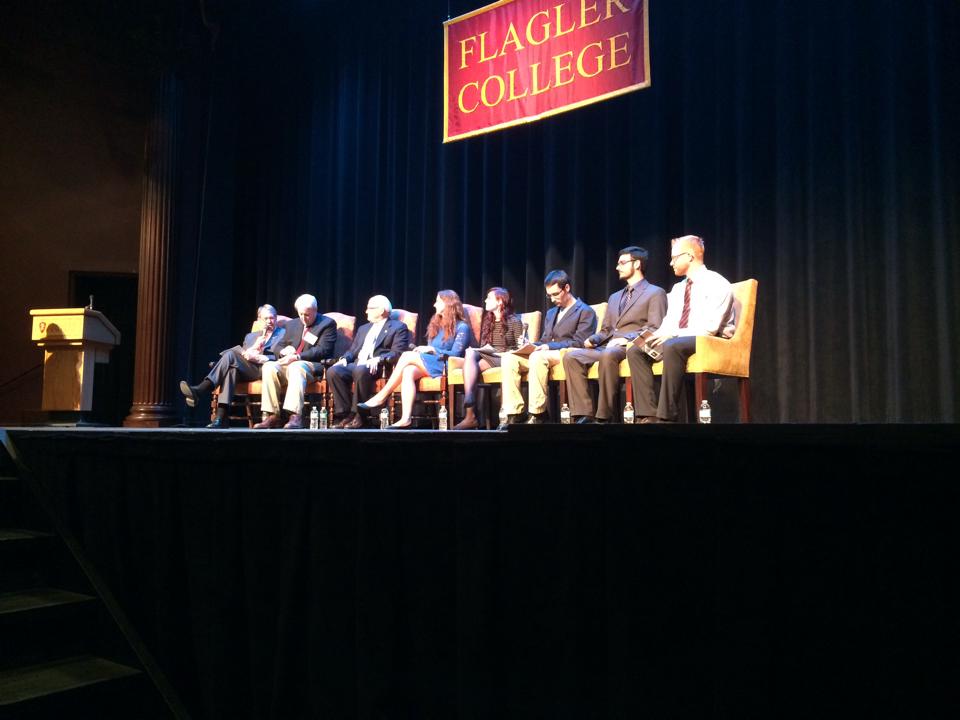By Michael Newberger | gargoyle@flagler.edu
Photos by Phillip C Sunkel IV
Our economy is in flames, unemployment across the country is at an average of 9 percent, homes are still foreclosing at an alarming rate, and “Dancing With The Stars” is one of the highest rated shows in the country. The American people have every right to be angry.
One of the largest outpourings of this collective anger, as you’ve probably heard by now, is the Occupy Wall Street movement. Some are hailing it as the catalyst that will finally rein in the corporate system that has run rampant in the post-recession world. Others feel that while it may not have tangible effects on the political system, it’s paramount that the people of the United States at least realize the dire economic straits that have befallen our country. And some people think that adopting the name “Moonstone” is a completely respectable idea, and that the positive vibes caused by bongo drums will exorcise the evils of capitalism.

Hundreds of citizens gathered at Hemming Plaza to show their support for Occupy Jacksonville and to have their voices heard.
Last Saturday, I went with some other members of the Gargoyle to Occupy Jacksonville, to see
if the movement had any sort of legs in spreading from the original protests on Wall Street. It was impressive how large the group was. There had to have been at least a couple hundred people gathered, most with hand-made signs and the usual goofballs in costume. I was initially rather impressed with the sheer scope of the protest. As a political cynic I was afraid that it would end up just being a small gathering of the usual: “Lets protest everything and change the system, man.” However, the diversity and size of the crowd showed that the movement had at least gone somewhere legitimate in that it could inspire such a broad array of people.
But unlike colleges and youth basketball teams, diversity is kind of a problem for the movement. Ask anyone heavily supportive of the Occupy protests about the actual “point” of it all, and you’ll most likely be told that the “point” is that there is no defined point. It’s supposed to be a representation of the majority of Americans, and that they’re really tired of getting asked that question.
I heard a variety of answers to the ol’ journalistic stand-by of “why are you here today?” from a variety of people. Some of the stories were, if not inspirational, at least the kind of views that actually lend some credibility to the protest. I met a man who was a legal immigrant, is a “small day trader,” and had to have his wife flown back to Argentina to deliver their son, due to health care costs here.
Rev. Craig Mears was there in support of the 99 percent (the rallying cry of the underclass adopted by the movement.) Mears said that the biblical idea of helping the poor was one of the most important tenets of Christianity and had been overlooked. What struck me the most out of anything said that day was that it’s not just all Wall Street’s fault. That the current culture of greed in all Americans was a principle factor in the hard times that we, as a nation, face. It’s easy to point a finger at Wall Street for perpetuating the bad loans for houses no one in their right mind could afford, but the people who took them are also to blame. While they didn’t take billions of dollars in bailout money, it took two to tango.
What I realized most of all is that the biggest problem with the protests wasn’t the messages themselves, but the lack of organization. While it’s impressive that such a group can organize so many people, it still needs some more, well, organization. The Occupy movement has been increasingly called “the Democratic version of the Tea Party.” But the Tea Party was able to take their angry, loosely knit shout-y people and turn them into a well-funded machine that even voted in its own congressman (for better or for worse, O.K., pretty much for the worst).
The Tea Party rally I attended a year ago had a set stage, planned speakers, and disconcertingly, a raffle for a gun. While I felt like there was a much, much lower chance of being shot at the Occupy movement, the day boiled down to standing and chanting with each other, then marching through downtown.
 Downtown Jacksonville consists of some bank buildings that no one works at on the weekends and your stereotypical chain restaurants like Starbucks and Chipotle. So, basically, the only other people were some slightly-amused cops and some families eating burritos. And we yelled at them about corporate corruption. Stickin’ it to the man!
Downtown Jacksonville consists of some bank buildings that no one works at on the weekends and your stereotypical chain restaurants like Starbucks and Chipotle. So, basically, the only other people were some slightly-amused cops and some families eating burritos. And we yelled at them about corporate corruption. Stickin’ it to the man!
I think this movement has a lot of good points that need to be addressed. There’s hope for their message, but it’s becoming time for more than just clever signs and catchy chants.




Be the first to comment on "The revolution will not be televised. It will be…..shouted?"